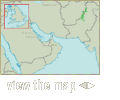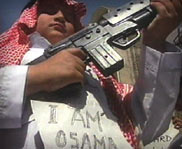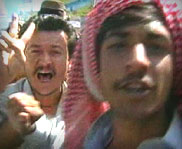|
+ "Indomitable" 23 September, Islamabad
from Marcela Gaviria 
 There is a swath of land in Pakistan, called the tribal areas, that has remained indomitable for centuries. British colonial officers, Indian rajas, Afghan warlords, Pakistani generals, Soviet armies, and American Green Berets have all tried to assert control over these wild lands. All have been unsuccessful. These loosely administered territories are not governed by boundaries or politicians but by tribal elders and tribal loyalties.
There is a swath of land in Pakistan, called the tribal areas, that has remained indomitable for centuries. British colonial officers, Indian rajas, Afghan warlords, Pakistani generals, Soviet armies, and American Green Berets have all tried to assert control over these wild lands. All have been unsuccessful. These loosely administered territories are not governed by boundaries or politicians but by tribal elders and tribal loyalties.
The tribal areas -- which comprise the agencies of Bajaur, North Waziristan, South Waziristan, Khyber, Kurram, Mohmand, and Orakzai -- are roughly the size of Florida. It is a prickly borderland that belongs to Pakistan on paper but has historical, cultural and ethnic ties to Afghanistan.
It is the land of the Pashtun, governed by a code of law called Pashtunwali. The Pashtunwali is to the tribal areas what omerta is to the Mafia: an unspoken set of rules that governs every aspect of life, from how to treat a guest to how to punish an unfaithful wife. To be honest, I know little of this rule of law, except that at its core are two fundamental principals: honor and revenge.
I learn this from our driver Faizal, who is a Pashtun and eager to share some of his cultural background with me. "If you come to my house. If you are my guest, then I must treat you like family. I will risk my life to save your honor."
It all sounds rather medieval to me. But it's not the first time on this trip that I've heard talk of honor and risking one's life to save another's. In our first few days in Pakistan another Pashtun told us, "You are my friends' friends. And so you are now my friends. And I will protect you with my life."
Of course, as foreigners, we are not allowed to step foot in this area, even though we have standing invitations from two Pashtuns. The little I know about the tribal areas comes from reading old magazine clippings and from watching the footage that has been filmed by our colleague, Hayat Ullah Khan.
It is a place that feels familiar -- the noise and bustle of the winding bazaars, the men in traditional Shalwar Kameez walking the crowded bazaars, the dusty valleys with horse-drawn tongas, the men with their weatherbeaten faces, and the occasional sight of a ghostly blue-robed woman making her way back home.
And then there are the unfamiliar images -- both magical and incongruous. A large group of tribesmen play a heated game of cricket while an avid crowd of fans cheer them on by waving their kalashnikovs; a circle of turbaned men dance to a frenzied drumbeat as they brandish their weapons; the unmistakable sound of kalashnikovs being fired as an unidentified car approaches a village.
 |  |
 |  |
 |
| A young bin Laden supporter in the FATA. |
 |
And then there is what I read. For instance, today I learn that in Pashto "cousin" is the same word as "enemy."
We've been wanting to enter this region for as long as we've been in Pakistan. We have pleaded, we have written letters, we have waited. We have even contemplated the thought of disguising ourselves in local garb and crossing into the area hidden in some packed Bedford bus.
When we finally interview President Pervez Musharraf at a sprawling mansion in the hills of Islamabad, we ask him if he will let us into the tribal areas. He tells us that we are not allowed in this area "for safety reasons."
"If you enter, you may be kidnapped," he says in perfect English.
Martin, sounding rather like a war correspondent in need of an adrenaline fix, answers, "It's a risk we are prepared to take."
So they shake hands on it. I fear it's not a Pashtun promise, but sheer bravado and promises meant to be broken.
Musharraf has his own insights on this wild and wooly land. He tells us that this region has remained unconquered for centuries for good reason. "The people want the government to come in. They want new schools and paved roads. But the tribal elders won't let this happen. If we are let in, the elders will no longer have control over all business contracts. It means an end to their kickbacks and commissions."
 |  |
 |  |
 |
| Religious protest in the FATA. |
 |
Just yesterday at Jenna Park in Peshawar, the elders of the tribal areas were giving impassioned speeches about how they would never let any force occupy or corrupt their land.
The elders, with their wonderful turbans and flowing beards, drove to Peshawar from towns like Bannu, Tobo Kokar, Tank, and Mianwali in a convoy of white sedans which arrived muddied from all the flooded roads they had crossed. At Jenna Park, they sat in a wide circle and beat drums to announce the beginning of the loya jirga. Each elder took turns at the invisible podium and shouted lengthy speeches in Pashto.
One elder, with his white robe and prayer hat, proclaimed, "The government is using Al Qaeda as an excuse to come into our land. We tell the government: even if we are all Al Qaeda you will never come into our land."

< previous dispatch + next dispatch >

|
London
(Aug. 13-14) |
+ Zubaydah Is Dead
13 August, London |
+ Armchair Jihadists
14 August, London |
Gulf of Oman
(Aug. 15-21) |
+ Faces at a Dubai Mall
15 August, Dubai, U.A.E. |
+ HMCS Algonquin
16 August, somewhere in the Gulf of Oman |
+ On Board the Algonquin
17-18 August, somewhere in the Gulf of Oman |
+ Like an Elephant Chasing a Mouse
17-18 August, Gulf of Oman |
+ Dubai to Karachi
20 August |
+ A Firehose of Information
20-21 August, Dubai - Muscat - Chennai |
Pakistan
(Aug. 22-29) |
+ Old Hash
22 August, Islamabad |
+ Nuclear Neighbors
22-23 August, Islamabad |
+ We Believe in God
24 August, Islamabad |
+ Paranoid in Peshawar
27 August, Peshawar |
+ Bombs or Dust Devils
27-28 August, Peshawar |
+ Rumors and Half Truths
28 August, Peshawar |
Pakistan Border Lands
(Aug. 30-Sept. 4) |
+ On the Road to Chitral
30 August, Dir Khas |
+ Prisoners' Dilemma
31 August, Dir |
+ In the Northwest Frontier
30-31 August, Dir |
+ Border Town
2 September, Chitral to Arandu |
+ Don't Go to Timargarha
1-2 September, Drosh to Timargarha |
+ An American Informer
3-4 September, Peshawar |
Pakistan
(Sept. 5-23) |
+ Road to Nowhere
7 September, Islamabad to Faisalabad |
+ Faisal Town
7 September, Faisalabad |
+ Frustrations
9 September, Faisalabad |
+ The Plight of Women
10 September, Faisalabad |
+ A Little Noticed Gun Battle
10-13 September, Lahore-Karachi |
+ The Madrassa
14 September, Akora Khattak |
+ The Next Big Get
20 September, Karachi - Islamabad |
+ A Circle of Trust
21 September, Islamabad |
+ Indomitable
23 September, Islamabad |
Saudi Arabia
(Sept. 24-Oct. 2) |
+ Inside the Kingdom
24-25 September, Riyadh |
+ My Baffling Question
27 September, Unizah-Buraydah |
+ An Obedient Dissident
27 September, Buraydah |
+ An Audience with the Crown Prince
2 October, Riyadh |
Yemen
(Sept. 25-Oct. 10) |
+ Arriving in Yemen
25-26 September, Sana'a |
+ The Wedding Party
27 September, Sana'a |
+ A Talking Drug
28 September, Sana'a |
+ The World's Most Ancient Skyscrapers
3 October, Sana'a |
+ Americans Are Vampires
7 October, Sana'a |
+ Waiting for Rahma
9 October, Sana'a |
|